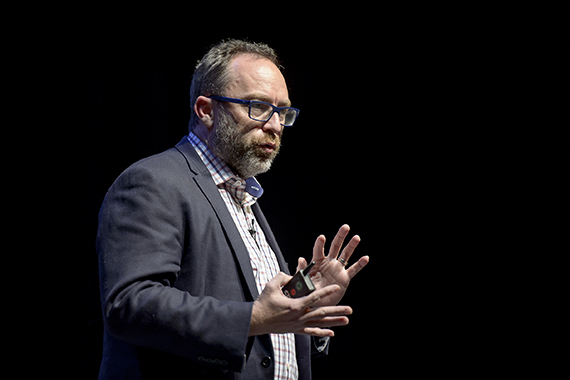 Jimmy Wales, founder of Wikipedia, speaks on the topic of "Democracy and the Internet" in Loeb Playhouse as part of the Purdue University Series on Corporate Citizenship and Ethics. (Photo by Charles Jischke)
Jimmy Wales, founder of Wikipedia, speaks on the topic of "Democracy and the Internet" in Loeb Playhouse as part of the Purdue University Series on Corporate Citizenship and Ethics. (Photo by Charles Jischke)
Information Liberation
Wikipedia founder discusses ‘Democracy and the Internet’
With a strong opinion on the evils of censorship and a belief that unjust rules were made to be broken, self-proclaimed pathological optimist Jimmy Wales is working toward a world in which every person on the planet enjoys free access to the sum of all human knowledge.
Wales, founder of Wikipedia, spoke about “Democracy and the Internet” on March 9 in the most recent installment of the Purdue University Series on Corporate Citizenship and Ethics. The lecture, held in Loeb Playhouse, was free and open to the public.
Wales said he formed Wikipedia after determining that his former venture, Nupedia, another online encyclopedia, was too restrictive. Unlike Wales' previous project, Wikipedia was built on the idea that freedom of speech is a fundamental human right that cuts across all political boundaries.
“We will never cooperate with the censorship of information,” Wales said. “Wikipedia is written as a free gift for everyone.”
The online, collaborative, international and free-content encyclopedia is currently accessible in 287 languages and provides information to around 550 million unique visitors per month. But that isn’t enough for Wales. Although 80,000 volunteers write for Wikipedia at least five times a month, he said, not everyone has the opportunity to benefit from and use the information.
Furthering his mission to make knowledge accessible to every single human being, Wales launched Wikipedia Zero in 2012. This program creates partnerships with cellular carriers to waive data charges to access Wikipedia on cellphones, catering to many people around the world who have access to the Internet only through a cellphone.
“It’s true enough that cellphones are helping fight malaria, but it’s thoughts like these that cloud the mind,” Wales said. “People in places like Nigeria are using cellphones to do more than send texts warning about a disease. The dotcom boom that we experienced in the '90s is happening now in Nigeria and it is changing the way that people access information.”
Wikipedia Zero has been launched in 46 countries and an estimated 400 million people who did not previously have access to the Internet now can benefit from all Wikipedia content free of data charges. Wales’ goal is to work eventually with every mobile operator on the planet.
“Think forward 20 years,” Wales said. “There will be massive connectivity to real Internet for hundreds of millions of people who do not speak English or French.”
Readying itself for this shift in the Internet and capitalizing on the free licensing that makes it possible for its content to remain so accessible, Wikipedia is working hard to expand and become more user-friendly. Though it is still necessary to learn a markup language in order to edit Wikipedia, the company is creating a simpler and more approachable platform to contribute to its content.
“We’re a human community, so it isn’t perfect,” Wales said. “But we’re a community with a great spirit.”
The Purdue University Series on Corporate Citizenship and Ethics is presented by the Krannert School of Management, College of Liberal Arts, Purdue Convocations, Purdue Discovery Park's Discovery Lecture Series, and the College of Education's James F. Ackerman Center for Democratic Citizenship, with support from Purdue Federal Credit Union.







